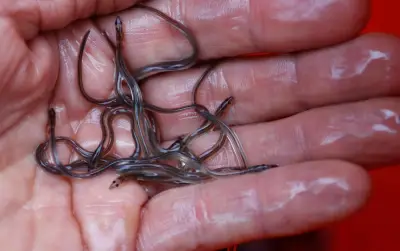Eel populations are falling, and new protections were defeated. Japan and the US opposed them

By PATRICK WHITTLE Associated Press SCARBOROUGH Maine AP Eels are the stuff of nightmares slimy snakelike creatures that lay millions of eggs before dying so their offspring can return home to rivers and streams They ve existed since the time of the dinosaurs and several species are more poorly understood than those ancient animals Related Articles Greta Thunberg banned from Venice after environment protesters dye Grand Canal green More snow rain and cold weather in store for post-Thanksgiving travelers The the bulk climate-friendly groceries might not be in the supermarket Your Thanksgiving leftovers are harming the planet There are approaches to shop and cook smarter What the air you breathe may be doing to your brain Yet they re also valuable seafood fish that are declining all over the world leading to a new push for restrictions on agreement to help stave off extinction Freshwater eels are critically crucial for the worldwide sushi industry and chosen species have declined by more than since the s The eels have succumbed to a combination of river dams hydroelectric turbines trash habitat loss state change illegal poaching and overfishing according to scientists Specific environmental organizations have called for consumers to boycott eel at sushi restaurants The loss of eels motivated the Convention on International Bargain in Endangered Species of Wild Fauna and Flora or CITES to consider new restrictions to protect the wriggling fish The members of CITES an international treaty met in Uzbekistan this week to determine if the new rules on agreement are needed Member nations voted against the new protections on Thursday Conservation groups mentioned the protections were long overdue but not everyone was on board A few fishing groups seafood industry members and regulatory agencies in the U S China and Japan all countries where eel is economically essential have spoken out against restricting the exchange The push for more restrictions is the work of an international body dominated by volunteer scientists and unelected bureaucrats announced Mitchell Feigenbaum one of North America s largest eel dealers and an advocate for the industry But several conservation groups countered that the protections were needed This measure is vital to strengthen contract monitoring aid fisheries management and ensure the species long-term survival announced Susan Lieberman vice president of international agenda for Wildlife Conservation Society FILE In this Thursday July photo a dish of eel nigiri is served at Miyake a Japanese restaurant in Portland Maine AP Photo Robert F Bukaty File FILE In this May photo baby eels swim in a bucket after being caught near Brewer Maine AP Photo Robert F Bukaty File FILE In this May file photo licensed eel fishermen Jessica Card left and Julie Keene shine flashlights into the water on the banks of the Penobscot River after setting a net in Brewer Maine AP Photo Robert F Bukaty File Show Caption of FILE In this Thursday July photo a dish of eel nigiri is served at Miyake a Japanese restaurant in Portland Maine AP Photo Robert F Bukaty File Expand Why are eels so valuable The eels in question are the eels of the anguilla genus which spend their lives in freshwater but migrate to the ocean to spawn They are distinct from the familiar grinning moray eels which are popular in aquariums and are mostly marine fish and the electric eels which live in South America Anguilla eels especially baby eels called elvers are valuable because they are used as seed stock by Asian aquaculture companies that raise them to maturity for use as food Freshwater eel is known as unagi in Japan and it s a key ingredient in numerous sushi dishes Eel is also culturally important in Japan where people have eaten the fish for thousands of years The elvers have become more valuable in the U S over the last years because of the steep decline of eels elsewhere in the world While the population of American eels has fallen the drop has not been as severe as Japanese and European eels Attempts to list American eels under the Endangered Species Act in the U S have failed Maine is the only U S state with a key fishery for the elvers and it is heavily regulated Maine s baby eels were worth more than per pound at the docks in and they were worth more than per pound the year before that New protections were on the table CITES which is one of the world s largest multinational wildlife agreements extended protections to European eels in The organization considered adding more than a dozen more eel species including the American and Japanese eels to its list of protected species Adding the eels to the list would mean exporters would need a permit to ship them Before the permit could be granted a scientific authority in the home country would have to determine that the export would not be detrimental to the species survival and that the eels weren t taken illegally under national wildlife laws That is key because poaching of eels is a major threat and rare species are often illegally passed off as more common ones CITES documents state Tightening pact rules will encourage species-specific contract monitoring and controls and close loopholes that allow illegal bargain to persist the documents state US Japan pushed back at protections Fishing groups are not the only organizations to resist expanding protections for eels as regulatory groups in specific countries have argued that national and regional laws are a better way to conserve eels Japan and China have both informed CITES that they don t endorsement listing the eels And in the U S the Atlantic States Marine Fisheries Commission which regulates the American eel fishery submitted testimony to CITES opposing the listing The U S s own management of eels is sufficient to protect the species revealed Toni Kerns fisheries approach director with the commission We don t feel that the proposal provides enough information on how the black territory would be curbed Kerns revealed We are very concerned about how it would potentially restrict business in the United States A coalition of industry groups in China Japan South Korea and Taiwan also submitted a request that the protection be rejected saying CITES assertion that international arrangement is causing eel populations to decline is not supported by sufficient evidence Conservationists say the time to act is now The strong demand for eels is a reason to protect the exchange with new rules revealed Nastya Timoshyna office director for Europe with TRAFFIC a U K -based nonprofit that fights wildlife trafficking Illegal shipping is not the only reason the eels are in decline but working with industry to cut down illegal pact will give the fish a better chance at survival Timoshyna revealed Eels might not be universally beloved but they re critical in part because they re an indicator species that helps scientists understand the soundness of the ecosystem around them Timoshyna mentioned It s not about banning it or stopping fishing practices Timoshyna commented It s about industry being responsible and there is massive power in industry Associated Press writer Michael Casey in Boston contributed to this assessment

